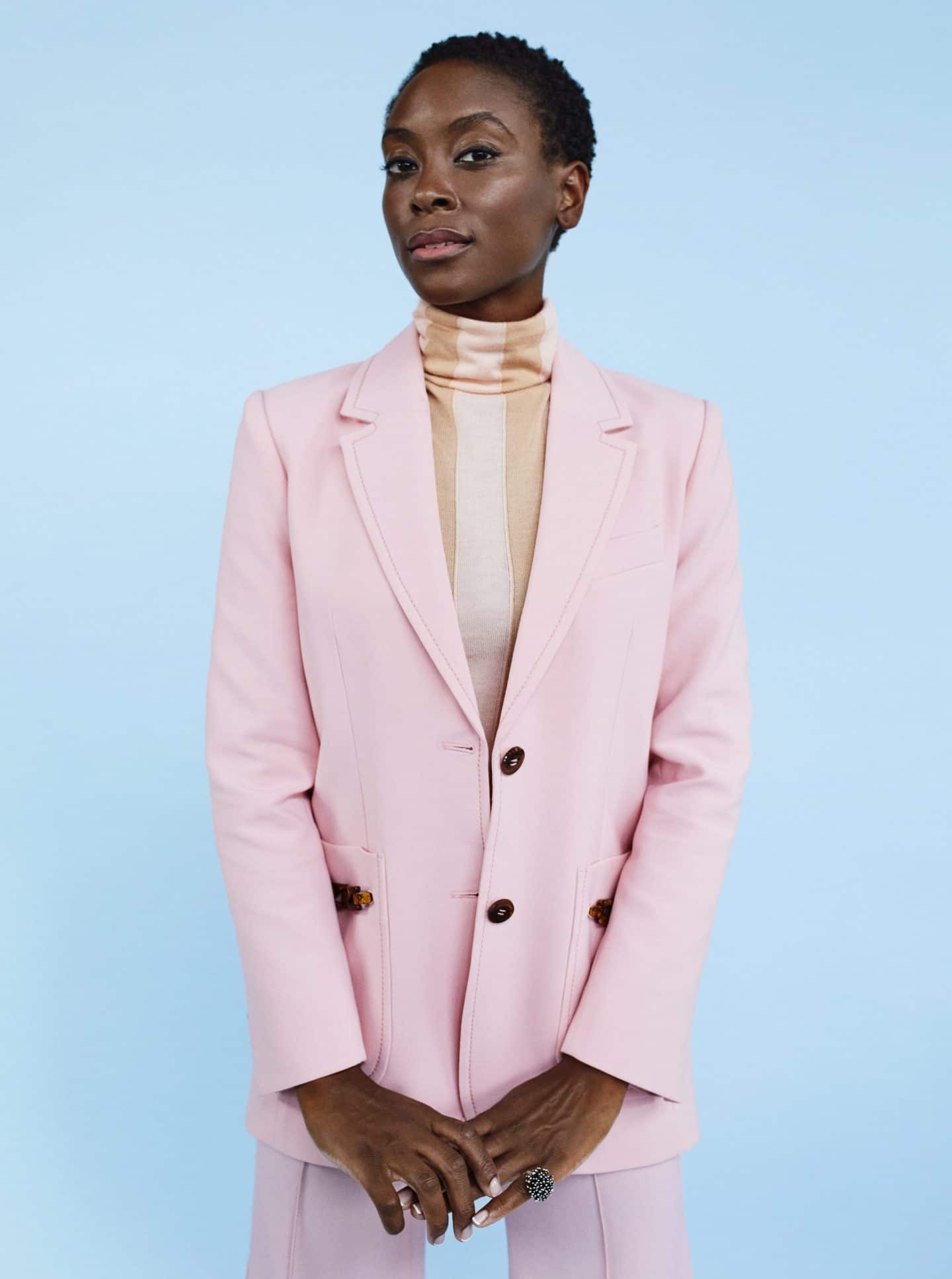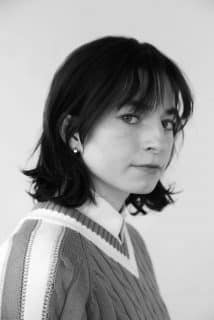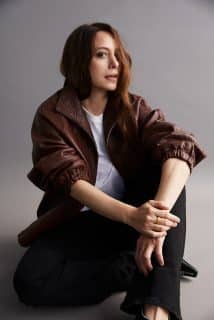Tracy Ifeachor on Showtrial and creating change
Culture
Tracy Ifeachor stars in the much-talked about BBC drama Showtrial, and tells us why she hopes the series can shed light on the justice system.
Tracy Ifeachor is currently making waves with the excellent new BBC drama, Showtrial. As duty solicitor Cleo Roberts taking on the defence of a spoilt student arrested for murder, the Devon born actor, who splits her time between New York and London, is a revelation: as strong a lead as you’ll see anywhere. And a deeply important one too – as any viewer of Showtrial will immediately see, this is a series touching on important issues of our age: the wheel of justice, the safety of women, and the dangers of assumption and public judgement. We spoke to Tracy to find out more, and found her to be a very smart and funny talent with an obvious determination to help create social and cultural change…
How was the pandemic for you?
So when we were all shut down, I was like, ‘I don’t want to just come out of this horrible experience, and not learned anything. What new skill can I learn?’ So I turned my little storage cupboard in New York into a recording studio. It looks really professional. I can’t believe I did it. I’m not good with power tools. But I bought this microphone and I just started learning about the craft of voiceovers. It just went from there really, I started doing these free courses on the SAG-AFTRA Foundation and even started my own voiceover workout group on Zoom. As a result of all this, I’ve just done a job on a really big game – I can’t say the name for reasons I don’t fully understand. Then I read for Cleo in Showtrial and here we are.
That was a very enterprising thing to do during lockdown…
Yeah, well how do you look after your mental health when you’re not even sure if you can go outside your house? Where I live in New York, it’s a nice apartment, but I was at a point where I thought, if I have to look at these walls again, something’s going to go very wrong. I was like, ‘What can I do that’s still creative?’ Yes, I can write but everything’s on Zoom and I can’t stare at a screen anymore. ‘What can I do that’s still acting?’ It’s interesting because voiceover work is so different. You have to really get yourself into it and like close your eyes and really pretend that you’re there. You feel a bit silly doing it but when you listen to it, it’s really good. And then I get to go and do a legal drama like Showtrial and do these amazing one take scenes which was so fun and very different to being a voiceover actor.
So when did you film Showtrial?
We started filming on the 12th of April which is the day things opened up after lockdown. For some reason, because of the scheduling and the restrictions, we had to start filming outside. So Cleo, the character, had to be walking down this high street. We started in the morning, and then the pubs opened about 11am and everyone descended. And so slowly, but surely, throughout this day, everyone just got drunker and drunker and drunker. People would shout things while I’m walking down the street: “You’re doing great, love” “Oh thanks.” “Are you doing it again?” One of the crew would say, ‘Action!’ and they would shout, “Action!” Two people on a scooter got really drunk, and during one of the turnarounds, I just felt this person fall on top of me. They didn’t even say anything, they just scooted off on the electric scooter. Why did we choose the day the pubs open? That was a harsh way to get back into being on set after being isolated – to literally have people falling on top of you.
Can you tell us more about the show, and your character?
It’s an amazing, and unique legal drama, with so many twists and turns. I play Cleo Roberts, who is a solicitor advocate, which is kind of ‘barrister adjacent’, the equivalent to a barrister. My character goes to the police station thinking she’s going to just defend someone on legal aid, and it’s going to be a very cut-and-dried case, but then the client gets accused of murder, and it becomes this massive show trial. What’s so exciting about it is that I’ve never seen the legal system explored in this way before. And from a female perspective, it’s led by me, a female, and it’s directed by a woman. It gets really exciting, and it forces us to examine our own prejudices. How many times have we, without naming a specific case, looked at somebody and gone, ‘They did it.’ And then it turns out they were completely innocent. Or we thought this person was not anything to do with it, and not only were they there, but they did it. The show forces us to examine what the ingredients are that go into making a verdict: the police, the defence, the prosecution, the witnesses, and all the other people. And how are people convicted or exonerated? On what basis? Is it the evidence? Is it the facts? Too many times you see people convicted in the court of public opinion, when maybe they haven’t even committed a crime.
When we just don’t like the look of them?
Yes – ‘there was something off about them.’ I really like this show because it’s got humour in it, as well, and I love that Cleo is fighting for justice. She’s an uplifting character who has a warmth to her and has a personality. She’s got stuff to say, she doesn’t suffer fools and she won’t be bossed around. She’s very, very strong, but she’s still human and feminine and ambitious and kind. So those are things that really attracted me to this this character.
She has to deal with quite a lot of unpleasant people in the series, and you’re in scenes against actors who are clearly relishing being as obnoxious as they can in those performances. Was that interesting to do?
Yeah. Because you have what’s going on on the inside, then you have to put a professional veneer over it. You have that as the character and you have that again as the actor. You have to find different ways in. The fact that she is so intelligent, Cleo Roberts, means she knows how to craft and knows what she wants to achieve and what she stands for. She fights for justice, she fights for the system, although she doesn’t always get it right. What looks good on one day with great intentions might not be the best thing. So it’s really interesting exploring that and exploring different people’s reactions to her, as well as her own reactions to the client and other characters in the show. We get to know each person kind of slowly.
Did you do much research into sort of the legal process?
I love the law. I have always had such a love of law. I wanted to be a policeman when I was a child, and then I grew up a little I wanted to be a lawyer. When I got to A level time, I realised that I love acting, I love theatre. But I still have a natural love of the law.
Alongside that I’m a really big fan of experiential research. There is no substitute for experience. It has to be coupled with a deep dive into the character and what you think of this person, too, but I actually asked production if I could go to court. This was during COVID, so we had to take all the precautions, but I went with an amazing barrister and even got to sit in on some of the negotiations between two sides. It was so interesting. They speak a different language. I understood most of it, but had to ask for clarifications. Hearing the two cases that I heard, I can’t say what they were, but it was harrowing. I don’t know that you can ever fully be prepared for some of the things that they have to hear. I take my hat off to them, it’s not an easy profession at all, but they do it with such grace and passion. That’s what I wanted to bring to Cleo really, to honour the people that help defend and prosecute in the criminal justice system because it’s not easy.
I also spoke to an amazing solicitor advocate called Cecilia Goodwin, who I became good friends with after. She did a documentary called Defending Digga D for the BBC. I was interested to know how she could defend someone she knew was guilty and she gave me the practical talk: you have a job to do. Something I wanted to take into the performance is that if we deny justice for the guilty, then we also deny justice for the innocent. Because you could just be in the wrong place the wrong time. Look at the appeals system we have, there are so many examples to choose from. I think this is one of the things that really attracts people to legal dramas, more than ever. We can all see videos online of injustice happening. You can literally have done nothing wrong, maybe you’re just taking your dog out like you do every morning, and then boom. I think that’s what attracts people to legal dramas like Showtrial. It could be anybody. And then the way it becomes a matter of if they are defended well, and how much does it cost? How much does justice cost? It has a price tag.

The show deals with violence against women, with girls disappearing from the streets. I’m not sure how it worked with the timing of the Sarah Everett murder, but was there heightened awareness on the production, as to how to handle this kind of material?
Well, with Sarah Everard obviously that is such a horrible thing to happen, and for all her family and friends. For women, we have lived with that fear, and everything she did was the right thing. I remember being picked up one time in the dark, on another production. I was stood outside in the dark in South Africa, and it was a gated community and I decided to go back inside. I remember saying to the driver who was coming, ‘Could you text me when you’re outside? I know the time you’re arriving, but could you text me?’ And he said, ‘No, it’s fine to come outside to wait.’ And I just remember the disconnect, you don’t understand how different it is when you’re a woman. In light of what’s happened some of my male friends have asked me, ‘How is it different?’ I say, ‘Do you ever go to look at an Airbnb or a new place to live and count the number of streetlights on the street? Do you ever look at your walk and try to imagine it at night?’
For us as women on the show, with most of the cast being women, and the director being one, we already had an innate understanding of what we’ve been living with, and with the case in the news. I just think it brought to other people’s attention. We already understood what we faced. With [the writer] Ben Richards, he’s obviously not a woman, but he’s a very secure, kind, generous individual, and he would ask, ‘What do you think of this? What do you think of this as a woman of colour? Would you say this?’ We would have these conversations. We’d have a spirited debate. So I think we had a team that was really understanding, and responsive and didn’t have really big egos, they were able to listen and ask questions when they didn’t know it.
I feel like women have just been living it – and Sarah Everard’s death has just brought to light a lot of what people didn’t know. But I’d read about it, and go, ‘that’s terrible, but what are we gonna do about it?’ Even though our show isn’t specifically about that, I hope people watch it and go, ‘Well, how can we change things?’ We’ve got to start educating young boys who will become men. We don’t all have this amazing example of great parents that love each other and are Brady Bunch tight families, we don’t all have that. So what happens when you don’t have that example? What happens when your example at home is violence, is disrespect towards women? We have to start educating the young boys, not just so that they won’t do those things, but also so they will understand the importance of walking somebody home. Women shouldn’t have to live in fear.
And I hope that this show actually encourages people to ask questions about the justice system, ask questions about how evidence is gathered. Because if we convict a person who is innocent, the guilty person is still out there. There are so many good police that are doing phenomenal work for really not a lot of money, and not a lot of recognition. How do we best support those officers that are doing a really good job and weed out the ones that are not? How we help the justice system isn’t by making cuts. How do we best support society by having a strong justice system?
How was it working back in UK now you’re living in the US?
I’m so excited to be part of a British drama again. There’s nothing like nothing like it. My first television job was on the BBC, so it’s a homecoming really. It’s an honour to lead a show and to be one of the first women who looks like me to do that. Obviously, there was ‘I May Destroy You’ which is amazing, by my sister from another mister. It’s really nice to celebrate all of these amazing women of colour who are doing these phenomenal things. It will be really nice for Showtrial to come out and for people who find themselves in any form of minority or ‘Other’ in any way, to watch the show and be emboldened and feel like they can do anything and can achieve and can keep going no matter what anyone else says.
Who were your big inspirations that made you want to get into acting?
The person that made a really big impact, beyond my parents, is not an actor: I remember the first time I ever saw Moira Stewart read the the news. I remember how I physically felt seeing somebody who kind of looked like me. I could see myself in that position. She was reading the news, and she wasn’t being called names. She was just who she was. Whereas growing up in Devon it was very different, you were not just who you were, you were what you looked like. And that’s part of the thing that attracted me to Showtrial, it’s that when we look at somebody, we make all kinds of assumptions about them. Whether they’re guilty, whether they’re innocent, whether they’ve had an easy life, whether they’re spoiled, whether they’re up themselves… we make all these assumptions that oftentimes aren’t even true. They’re based on our own preconceptions. And hopefully, this will challenge people to think about their own. It certainly did for me.
Showtrial is on Sundays at 9pm on BBC1 and on BBC iPlayer.
Follow Tracy on Twitter:
#SHOWTRIAL from @worldprods starts tonight, 9pm on @BBCOne You can also binge watch all the episodes on @BBCiPlayer after the first episode tonight! Are you ready? 👀#bbcone #bingewatch #newseries #tonight pic.twitter.com/4JzPMcKHVv
— Tracy Ifeachor (@Tracyifeachor) October 31, 2021
Trending

Join The Book of Man
Sign up to our daily newsletters to join the frontline of the revolution in masculinity.

















